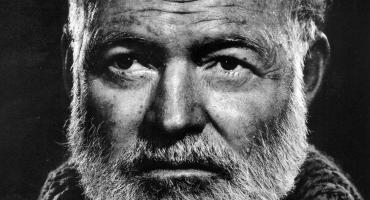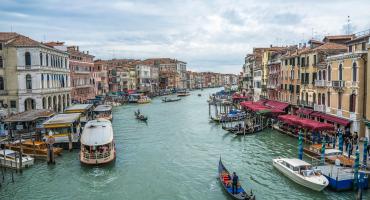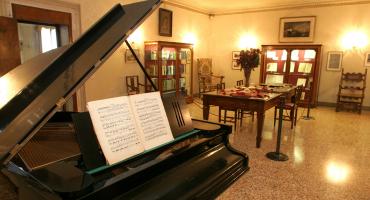Looking for experiences and services in Venice and Italy? Visit Venice Incoming and discover our proposals!
Venice has often been an object of tension and a never placated desire by writers and literary men searching continuously, as well as a source of inspiration through imagination with plurality and richness of meanings.
These meanings often find in Venice a chosen place and often even in a shape of a dream – it is exactly a dream and capacity to fantasize with eyes wide open, like when we were children, that many literary men have found in Venice.
According to John Ruskin, in his famous ideological testament “The stones of Venice”, art of a nation is a precise indication of its moral temperament and decline of Venice rather than surrendering to the Turks or opening the road for Head of Good Hope, starts with a rough image accomplished by Titian in his last artwork: faith had become carnal. In the renaissance a man is in the centre and aesthetic formalism gets the upper hand over gothic ascetism, so Venice becomes an archetype which gives Ruskin an opportunity for a parable on decline of moral and a review of the society when the sense of cooperation and honour leave room for the market rules. A warning of his is still actual that needs to be reflected from this city all over the world, suspended between apocalypse and utopia, and though many of her palaces are for ever defaced, and many in desecrated ruins, there is still so much of magic in her aspect, that the hurried traveller, who must leave her before the wonder of that first aspect has been worn away, may still be led to forget the humility of her origin, and to shut his eyes to the depth of her desolation. Ruskin wants to retain at least one image before it gets lost forever picking up the warnings of the waves that are hitting restless fellow men at the tolling of a bell to death. An image that Thomas Mann then made in Death in Venice and Visconti rendered with masterly skill in the homonymous film.
An admonition that had indeed been done in a certain way by Lord Byron, in fact the English writer and poet, during his 5 years of Venetian life in a hotel, confirms this sense of decadence and foresees death of the city: "Palaces are ruined, music is not heard any more, those days had gone by and remains only the beauty of this dying glory…”
On the other hand, it was Richard Wagner who died in his house on the Grand Canal after having composed Tristan and Isolda; he had maybe been inspired by Venice with a brilliant funeral omen in the composition of compelling lament by the pastoral chorus in the third act.
On morning in Paris, Marcel, main character of the novel “In search of lost time” trips on a pavement slab; this banal incident evokes in him a similar sensation of the past that goes back to a visit to the St Mark’s Basilica and from that moment his broken up and senseless self is reassembled like a mosaic. “Time regained” is the last chapter in the Proustian research of a long discovery journey that finds its reassembly in Venice.That journey to Venice got Marcel Proust inspired by reading Ruskin and, like many other artists, he had dreamt about it for a long time, convinced that Venice would be the summa of his cultural and aesthetic experiences.
When Goethe arrived to Venice in 1786, after having left his ministerial post, he also accomplished his youth dream, had a way of writing “all that surrounds us is full of nobility, it’s a great work and respectable of a human concord force, a magnificent monument not by a sovereign but by a nation, even if the trade strength of Serenissima declines, nevertheless its grandiose structure and its character won’t cease for a moment to appear to the observer worthy of reverence”.
So, in Venice for artists it seems normal that the senses of artists get stimulated. In fact, Luigi Nono wrote about Venice that "in Venice you learn to watch and see the invisible and inaudible, the stones and bricks, the darkness, the water, the light, the things that talk". Maybe because in Venice there isn't that patina of modernity which homologates, confuses and clogs up everything.
Here is an original way how to look at her, as suggested another eminent Venetian: Tiziano Scarpa asks us to discover her through visual points of the senses and pleasure that we feel by crossing her - through our feet, eyes, ears and nose.
Another, even more poetic way to discover Venice is the one suggested by Joseph Brodsky in "Fondamenta degli Incurabili": learn to feel like a cat, leaving that things come to us, until at the end, like the moon has the power to control the tides, a seemingly passive cat owns the maximum selective capacity that allows to pick up the hidden meanings of things. "I am a cat" Brodsky was struck by this sensation of absolute animal happiness in Venice one morning rubbing a wall in Fondamenta dei Mendicanti and winking his eyes to watch the sun. From that moment there had always been a cat inside of him and if it hadn't been for that cat, he said: "at this time I would have climbed up the walls of some institute for wealthy guests".
Today we, cats, wise in a kind of creative idleness, can enjoy the Venice-therapy through the energy that the light and the water of this magical place give to our muscles, our heart and our soul…



